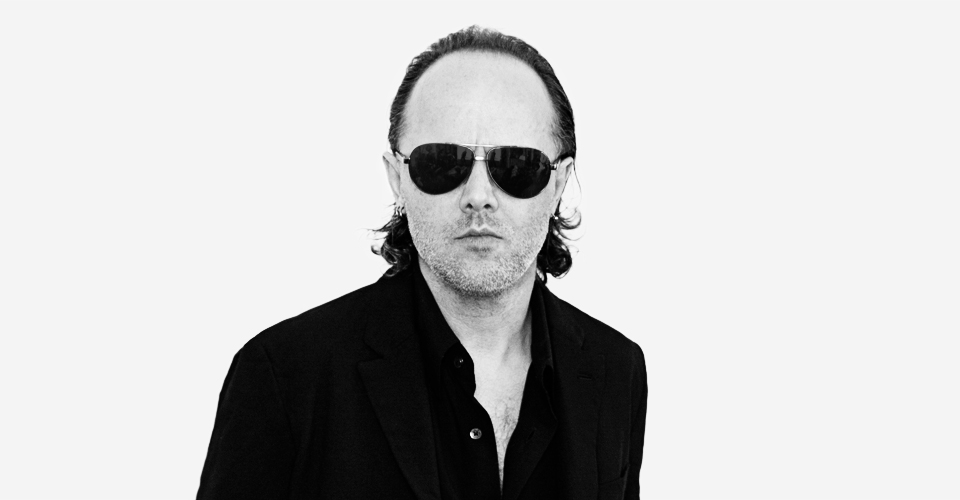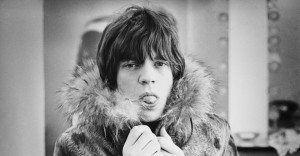Lars, have you always been interested in art?
I grew up in a household that was pretty rich culturally. In Copenhagen in the late ’60s there was a lot of music, a lot of art, a lot of cultural awareness of what was going on in the world. So I was really very interested in things like Warhol and I remember very early on my parents introduced me to artists like Marc Chagall and different things like that.
In the 2004 film Some Kind of Monster you were documented auctioning your collection of modern artwork for over 13 million dollars. When did you start collecting art?
I spent a lot of time sitting around on airplanes and in the late ’80s, early ’90s I just started reading art magazines, art catalogues, getting into Sotheby’s and Christie’s catalogues and seeing different things I like. There was a Warhol my parents used to have hanging in the dining room when I was a kid and when they split up and I went to form Metallica they sold it. So as I started making some money with Metallica, I decided to try to track this Warhol. It was a Warhol with three apples on it, and signified my mom, my dad, and myself. I tracked it down and bought it back – that was sort of the first art purchase I did. Then slowly over the next couple of years I started buying things like Karel Appel, Asger Jorn, some of the Cobra guys, some of the outsider art guys like Dubuffet.
Were you just trying to figure out what to do with all the money you had made with Metallica?
No, it wasn’t so much about the money. When you are 17 or 18 or 19 and you are playing music, it is like a gang mentality – we all wore the same clothes, ate the same food, drank the same alcohol, listened to the same music. And I think art became the first thing, 10 years after forming Metallica, that I really did by myself. It was the first time I felt anonymous and I felt kind of free of the set of rules that rock groups live by. In the art world I was myself. I wasn’t the guy from Metallica, I was just Lars. I was only going after things that appealed to me and I felt very free. I think it was really needed for me at that time. So it was a journey that started in the early ’90s that was really about me kind of finding myself and finding my own voice.
Did you have a hard time fitting into the art crowd as a long-haired metalhead?
At that time the art world was quite conservative still and so if you were a 28 or 30 year old guy with long hair and earrings and stuff like that there was a little bit of a “Who the fuck are you?” kind of thing, for sure. I remember walking into a jewelry store in Beverly Hills on the And Justice for All tour in 1988 and they thought I was going to rob the place. If you wanted to get into a nice restaurant, they wouldn’t let you in if you had long hair. But when you were able to buy paintings, that was your ticket to being taken seriously and that you weren’t just some bum that had walked into the gallery by mistake. It is different nowadays.
Back in the ’80s it seems like metal was also not as mainstream as it is today. Do you agree?
I am not the person to ask that kind of question to, but certainly the world is a smaller place than it was 20 or 30 years ago. When you were going to different corners in the world the local aesthetics were much more prevalent at that time. We just did a run in Malaysia, Singapore, Indonesia, China and all these places and it is still Starbucks and Burger King and the same sort of thing that it is everywhere else in the world. The first time we were in Japan in 1986 it was like going to a different universe. The first time we went behind the Iron Curtain in 1988 we went to Hungary it was like going to the moon. Nowadays music penetrates on a global basis in a way it probably didn’t do before.
Do you think of yourself as an artist through your work with Metallica?
I think as you get older you start looking at yourself a little bit more as an artist, yeah. But this is also a contrived word – “I am an artist, I am so fucking cool.” It is not really like that. What do artists do? They create. Am I an artist? Yeah, I create things, I dream things, I see things in my mind or hear things and I try to facilitate them.
You once said that Metallica “is not a product, it is real people, writing real songs, without worrying about what the consequences are.” To me that is an important part of art – doing something for no one but yourself.
Obviously we love and appreciate our fans and everything that comes with that, but ultimately you have to do what you do for yourself. I think there is a lot of music that is quite product-oriented and there isn’t anything wrong with that. Certain music is fine with that – three minute songs and these types of dynamics that make them more acceptable for the radio, for mass media. We just never really played that gig. When you try to sell a product, you make it as appealing to as many people as possible so you can sell as much of your product as possible and that is not the way we have ever looked at what we do. If we wanted to sell a product, we could just sell toothpaste.
How have you learned to deal with the enormous expectations from a band of Metallica’s stature?
I think you just train yourself like anything. You train yourself to block it out and you got to have to train yourself hard because nowadays with the Internet and with everybody having an opinion it is harder, you have to be more careful as you navigate through a lot of that stuff as people say some very, very unpleasant things. 20 years ago you would make a record and somebody would critique the record. Like, “This is a good record, this is not a good record. This is why it is not a good record.” Whatever. Now it is like, “Lars Ulrich must fucking die!” Do you know what I mean? It is like a different thing and it is much more a scathing and there is a whole kind of thing about expectations and people express their viewpoints, both good and bad and so on. If you pay attention to it, you have to learn how to not own it. You have to learn to not take it with you. And I am pretty thick-skinned, so I think we have a fairly good balance.
A lot of people argue that Metallica made a string of shitty records from the mid-’90s until the 2000s and your last record in 2008 was your first return to form in around 20 years. How do you view that?
The bad thing the Internet is that at some point everything becomes these super short sound bites. Everything is sort of getting shorter and shorter because people have a shorter and shorter attention span and there’s a tendency to define everything. So define Metallica: “Metallica had a bunch of pioneering records in the ’80s and then they had a slump in the ’90s and then they figured it all out again in the 2000s.” If our slump was the mid-90s, I think that’s pretty good. We pushed four records out in four years – ’96, ’97, ’98, ’99 – and if those four records are our not-great records, then I’m pretty happy with that because I think all four of those records are pretty fucking cool.
So how would you define Metallica?
Listen, each one of those records, each one of those time frames, was always the best it could be at the time, the most it could be, the best we had to offer. The one thing I’ll always hold my head up high about is that 32 years later, it’s been quite a ride – it’s been a pretty pure ride, a pretty honest ride, a pretty straight ride – we haven’t done things for ulterior motives or tried to do things for commercial gains or for this or for that, so I feel pretty proud of all of it. I think I can look myself in the mirror and go, “It’s okay,” because that was what I felt at the moment and I did my best. I’m pretty pleased with the first 32 years, so we’ll see what the next 32 years bring.
You’ll be 50 at the end of the year, so that would make you a pretty old drummer.
I’m 49 my friend! No, listen, fucking age means nothing to me. I’m happy with having lived a lot. I love all the experiences and all the… I was going to say wisdom, but I won’t say that. Whatever it is that comes in the wake of living a lot and having kids and keeping your eyes wide open.
Do you feel like you’ve packed a lot of life in your years so far?
I started really young. I formed Metallica when I was 17 and when I was 18 we were travelling around and we made our first record when I was 19. I’ve done a lot of shit already and it’s been pretty crazy and pretty cool and I’ve done lots of fun, kooky things, so… so far, so good.
I think that’s a great attitude. Someone once told me that you should never be ashamed of your own art because it’s just a snapshot of who you are at that moment in time.
I’m not one of these guys that will sit there and give this sort of “everything happens for a reason” bullshit. I believe that you’re a result of the choices that you make and I think that everything that you do is connected to everything else that you do. Each action has a reaction. So this interview will make me think about some of the things that you and I have just talked about and maybe I’ll look at the world slightly different tomorrow. And then another set of circumstances will happen tomorrow. I don’t know if that sounds too philosophical. (Laughs) Somehow it’s just all connected and I wouldn’t change any of it.
Return to Top

Short Profile
Name: Lars Ulrich
DOB: 26 December 1963
Place of Birth: Gentofte, Denmark
Occupation: Musician
Recent Project: Metallica Through the Never





















Great interview with an interesting guy.
I love Lars. Im 36. Metallica has been my best friend since i was 9. Singularly the most enjoyable facet of my life and I am very happy to have them in my ears for all these years.
I respect Lars a lot. He does not regret publicly choices he’s made that probably thinks were wrong, he stands by them. As you you grow, you obviously change, you can’t think or act the same as when you were in your 20’s and a lot of fans do not understand that. It was his vision that made Metallica happen in the first place and for that I will be forever grateful, no matter how many drum fills he misses or how many double bass parts he omits during a concert. The man is a living legend.
Ernesto,
fully agree with you.
I hear people talking down Load, Reload and St. Anger, which is unfair. Fuel and Memory are fan favorites at a live show. Sleeps and Bleeding Me could be on a Puppetz album. St. Anger sounds unfiltered, dirty, and, well, angry. It doesn’t get enough credit, especially after we can see what the band was going through at the time. Much respect to Lars, he gets the most negative responses online, and not deserved.